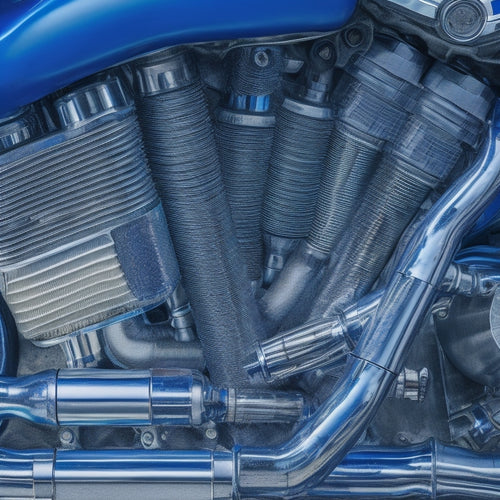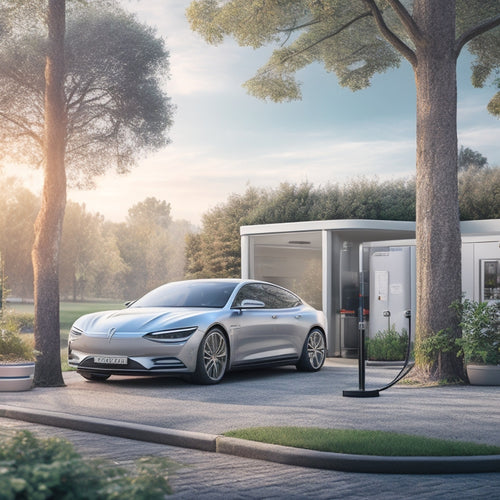
7 Essential Tips for Residential Solar Panel Systems
Share
You're about to install residential solar panels, but where do you start? First, assess your energy needs by analyzing past bills and identifying areas for improvement. Then, choose the right solar panels by considering efficiency, durability, and warranty. It's important to understand solar panel efficiency, as only 20% of the sun's energy is converted into usable electricity. You'll also need to select a reputable installer, optimize your roof for solar, navigate incentives and rebates, and maintain your system. By following these essential tips, you'll be well on your way to maximizing the benefits of residential solar panels - and discovering even more secrets to a successful installation awaits.
Key Takeaways
• Assess energy needs and optimize system size based on past electricity bills and energy consumption habits to ensure the right system for your home.
• Choose high-efficiency solar panels with durable design, excellent weather resistance, and a 25-year warranty for maximum energy output.
• Select a reputable installer with licenses, certifications, and experience who complies with local building codes and industry standards.
• Ensure your roof is suitable for solar panels, considering angles, shading, size, and layout for optimal energy production and structural integrity.
• Take advantage of federal and state incentives, such as the Solar Investment Tax Credit, net metering laws, and rebates to maximize your solar investment.
Assessing Your Energy Needs
To determine the size of the residential solar panel system you need, you must first calculate your energy requirements by analyzing your past electricity bills and identifying areas for improvement in your energy consumption habits. This process is vital in determining the size of the system that will meet your energy needs.
Conducting an energy audit is a great way to start. This involves reviewing your historical consumption patterns to identify opportunities to reduce your energy usage. By analyzing your energy usage patterns, you can identify which appliances and devices are consuming the most energy and make adjustments to reduce your overall energy consumption. This will help you ascertain the size of the solar panel system you need to meet your energy requirements.
It's important to review your historical consumption patterns to ascertain you're installing a system that meets your energy needs. By doing so, you'll be able to optimize your energy usage and maximize the benefits of your residential solar panel system.
Choosing the Right Solar Panels
When selecting the right solar panels for your residential system, you'll want to take into account several key factors.
You'll need to balance panel efficiency with durability and warranty, as well as budget-friendly options that meet your energy needs.
Panel Efficiency Matters
Your solar panel system's overall performance hinges on the efficiency of individual panels, which can vary greatly depending on the type and quality of photovoltaic cells used in their construction.
When selecting solar panels, you'll want to take into account the efficiency rate, which is typically measured by the amount of energy produced per unit area. Higher efficiencies mean more energy harvesting, even in smaller spaces. However, high-efficiency panels often come with a higher price tag.
Another critical factor is cell temperature, which greatly impacts panel performance. High temperatures can reduce energy output, so it's important to choose panels with a low temperature coefficient. This ensures that your system maintains its energy harvesting capabilities even on hot summer days.
When evaluating panel efficiency, look for products with high conversion rates, low temperature coefficients, and a durable design. By prioritizing panel efficiency, you'll maximize your energy output and reduce your reliance on the grid.
Durability and Warranty
Solar panels are only as vital as their durability and warranty, so it's important you choose panels that can withstand the elements and last for decades to come. You'll want to look for panels with excellent weather resistance, able to withstand harsh weather conditions like heavy rain, hail, and extreme temperatures.
A good warranty will provide you with peace of mind, knowing you're protected in case anything goes wrong.
When evaluating durability, look for panels with a robust frame and tempered glass or a durable polymer backsheet. These features will help secure your panels can withstand the test of time. A performance guarantee is also essential, as it ensures the manufacturer stands behind their product's energy output.
Look for a warranty that covers at least 25 years, with a guaranteed minimum energy output percentage. Some top manufacturers offer a 30-year warranty, so be sure to research and compare warranties before making a decision.
Budget-Friendly Options
You'll need to balance durability with affordability, and fortunately, there are budget-friendly options available that can meet your energy needs without breaking the bank. When choosing the right solar panels, you don't have to sacrifice quality for cost.
Here are some cost-cutting measures to keep in mind:
-
Efficiency vs. Cost: Opt for solar panels with lower efficiency ratings, which are often cheaper. While they may not generate as much power, they can still provide noteworthy energy savings.
-
Tier 2 or Tier 3 Panels: Instead of high-end Tier 1 panels, consider Tier 2 or Tier 3 options, which offer similar performance at a lower cost.
-
Used or Refurbished Panels: Explore the option of buying used or refurbished solar panels, which can be much cheaper than new ones.
- Financial Incentives: Take advantage of government tax credits, rebates, and other financial incentives that can help offset the upfront cost of your solar panel system.
Understanding Solar Panel Efficiency
About 20% of the sun's energy that hits a solar panel is converted into usable electricity, a demonstration of the remarkable efficiency of modern photovoltaic technology.
As you consider installing a residential solar panel system, understanding solar panel efficiency is important. You should know that energy conversion is a complex process, and several factors affect a panel's ability to generate electricity.
One significant loss occurs during energy conversion, where some energy is lost as heat. This is known as thermal losses, which can reduce a panel's overall efficiency. You'll want to look for panels with high efficiency ratings, typically above 20%, to maximize your energy output.
Additionally, panels with lower temperature coefficients will perform better in hot climates, reducing thermal losses. When evaluating different panel options, consider the efficiency ratings and thermal loss coefficients to make sure you're getting the most power out of your system.
Selecting a Reputable Installer
When choosing a reputable installer for your residential solar panel system, you'll want to begin by verifying their licenses and certifications. This guarantees that the installer has the necessary qualifications and expertise to handle the installation process.
Next, you'll want to check their experience, including the number of installations they've completed and the type of systems they've worked with in the past.
Verify Licenses and Certifications
Before hiring a solar panel installer, confirm that they possess the necessary licenses and certifications to guarantee a safe and efficient installation. This vital step ensures that your solar panel system is installed correctly, meets local building codes, and complies with industry standards.
To verify an installer's credentials, conduct a thorough contractor screening and compliance checks. Here are some essential certifications and licenses to look for:
-
State-issued contractor's license: Confirm that the installer has a valid license to operate in your state.
-
North American Board of Certified Energy Practitioners (NABCEP) certification: This certification verifies that the installer has the necessary knowledge and skills to design and install solar panel systems.
-
OSHA certification: This certification indicates that the installer has completed occupational safety and health training.
- Manufacturer certifications: Check if the installer has certifications from specific solar panel manufacturers, indicating their expertise in installing those systems.
Check Their Experience
You should research the installer's past projects and customer testimonials to gauge their expertise and reliability. A thorough portfolio review can reveal the quality of their work, the types of systems they've installed, and the challenges they've overcome. Look for reviews and ratings from reputable sources like the Better Business Bureau, Yelp, or Google Reviews. This will give you an idea of their reputation and customer satisfaction levels.
It's also essential to inquire about employee turnover rates. High employee turnover can be a red flag, indicating poor management or inadequate training. You want an installer with experienced technicians who've been with the company for a while. This guarantees that the team working on your project has the necessary skills and knowledge to get the job done correctly.
Optimizing Your Roof for Solar
Optimizing Your Roof for Solar
To maximize energy production, a southeast-facing roof slope with minimal shading is ideal for residential solar panel systems. This orientation allows for the most direct sunlight exposure, resulting in higher energy output.
When evaluating your roof's suitability for solar panels, consider the following factors:
-
Roof angles: A slope between 15° and 40° is ideal, as it allows snow to slide off while still providing adequate sunlight exposure.
-
Shading analysis: Identify any obstructions, such as trees or neighboring buildings, that could cast shade on your roof and reduce energy production.
-
Roof size and layout: Confirm that your roof is large enough to accommodate the required number of solar panels, and consider the layout to optimize energy production.
- Structural integrity: Verify that your roof can support the weight of the solar panels and withstand local weather conditions.
Navigating Incentives and Rebates
Understanding Incentives and Rebates
Federal and state governments, as well as utility companies, offer various incentives and rebates to offset the upfront cost of residential solar panel systems, and it's important to grasp these opportunities to maximize your investment.
You'll want to take advantage of the Solar Investment Tax Credit (ITC), which allows you to claim a tax credit of 26% of your total solar panel system cost. Additionally, many states have their own policies and incentives, such as net metering laws and renewable portfolio standards, which can further reduce your costs.
Research your state's policies to see what benefits you're eligible for. For example, some states offer rebates or grants for residential solar installations, while others provide property tax exemptions or sales tax exemptions.
Maintaining Your Solar System
Regular inspections and maintenance of your solar panel system are crucial to guarantee its peak performance and extend its lifespan. You'll want to make sure your system is running efficiently to maximize your energy savings. To do this, you'll need to perform regular checks and maintenance tasks.
Here are some essential maintenance tasks to add to your schedule:
-
Regular Cleaning: Dirt and debris can reduce your system's energy output. Clean your panels regularly to maintain peak performance.
-
Performance Monitoring: Keep an eye on your system's performance to identify any issues early on. This will help you address problems before they impact your energy production.
-
Inspect for Damage: Regularly inspect your system for signs of damage, such as loose connections or broken panels. Addressing issues promptly will help prevent further damage.
- Check Inverter Performance: Ensure your inverter is functioning correctly, as it's a critical component of your solar panel system.
Frequently Asked Questions
Can I Install Solar Panels on a Shaded Roof?
You can install solar panels on a shaded roof, but consider the impact of shaded areas on energy output. Guarantee ideal roof orientation and evaluate potential energy losses due to shading to maximize your solar investment.
Do Solar Panels Work During a Power Outage?
You'll find that solar panels alone won't provide power during an outage, but with grid resilience and backup systems like batteries, you can enjoy uninterrupted energy supply when the grid goes down.
Can I Sell Excess Energy Back to the Grid?
Imagine sailing on a sea of excess energy, where your solar panels are the wind in your sails. With Net Metering, you can sell back excess energy to the grid, earning Renewable Credits, and harvesting a bounty of savings.
How Long Does a Solar Panel Installation Take?
You'll typically wait 2-6 weeks for the permitting process, then an installation crew will complete the job in 1-3 days, depending on the system's size and complexity, getting you powered up quickly.
Do Solar Panels Void My Roof's Warranty?
'Your roof is a canvas, and solar panels are the brushstrokes of sustainability. If you're wondering, installing solar panels won't automatically void your roof's warranty, but it depends on the roof material and warranty coverage; check with your provider to guarantee a harmonious coexistence.'
Related Posts
-

3 Ways to Increase Motorcycle Horsepower
You're about to unleash your motorcycle's hidden power by exploiting three key areas. First, upgrade your electric mo...
-

7 Best Home Electric Vehicle Charging Station Setups
When selecting a home electric vehicle charging station setup, consider a Level 2 charging station with a dedicated 4...
-

5 Best Online Stores for Green Vehicle Solutions
You're on the hunt for an eco-friendly ride, and online stores are a great place to start. You'll find top retailers ...


